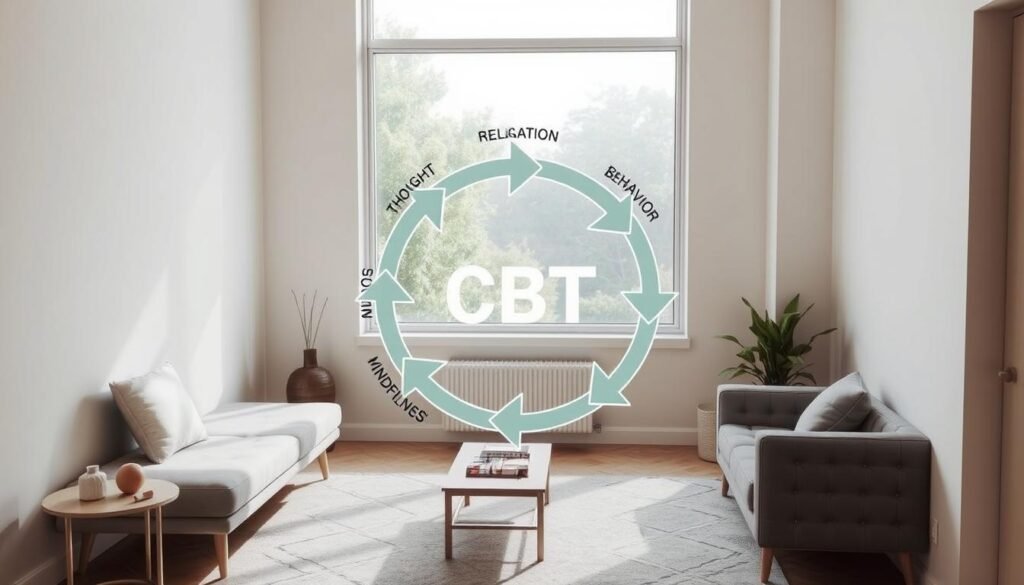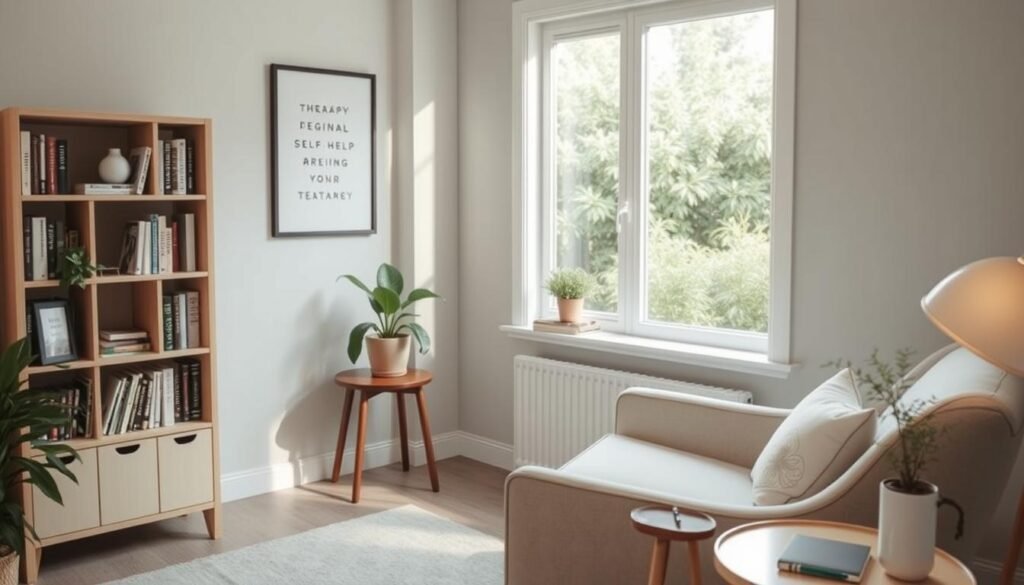About 80% of Americans think therapy is a good investment for mental health. This shows more people are open to treatments like cognitive behavioral therapy (CBT). CBT is a top choice because it is very effective and often quicker than other therapies.
We’re looking at different ways to tackle mental health issues, focusing on CBT. We’ll also see how medicine and lifestyle changes help CBT work better. It’s important to know about all the options to take good care of our mental health.
Cognitive behavioral therapy helps change negative thinking and teaches how to handle emotions better. Reducing stress is key for mental health, too. Using natural ways to boost adrenal health through lifestyle changes is very helpful. All these methods together improve mental health significantly.
Key Takeaways
- Cognitive behavioral therapy (CBT) is widely recognized as an effective treatment for various mental health conditions.
- CBT typically requires fewer sessions than other therapeutic approaches, making it a time-efficient option.
- Complementary treatments, including medications and lifestyle adjustments, can enhance the effectiveness of CBT.
- CBT empowers individuals by providing coping mechanisms rather than simply curing conditions.
- Recognizing the importance of lifestyle choices is crucial for overall mental health and wellness.
Understanding Cognitive Behavioral Therapy (CBT)
Cognitive Behavioral Therapy, known as CBT, is a focused and goal-driven type of psychotherapy. It tackles mental health issues by changing negative thoughts and actions. CBT is unique because it looks at both past events and what’s happening now. This makes it effective for many problems.
Studies show CBT works well for depression, anxiety, and serious mental illness, among other conditions. It’s a leading method in counseling due to its success. Experts say CBT often gives better or similar results compared to other therapies or medications.
CBT aims to teach people to be their own therapists. Through practical tasks in sessions and homework, it helps continuous improvement. This involvement is crucial for success. CBT gives tools for dealing with daily life better, boosting mental health.
| Condition | Effectiveness of CBT |
|---|---|
| Depression | High |
| Anxiety Disorders | High |
| Eating Disorders | Moderate |
| Substance Use Disorders | Moderate |
| Chronic Pain Conditions | High |
| Obsessive-Compulsive Disorder | High |
| Panic Disorder | High |
CBT is highly supported by research as a main therapy for mental health. It focuses on the present and is structured to help people help themselves. It’s a valuable option for improving psychological health.
Core Principles of CBT
Cognitive Behavioral Therapy (CBT) focuses on a structured way to improve mental health. It aims for specific goals within a set timeframe. It helps people build skills to deal with stress and overcome difficulties. By working on harmful thinking patterns, CBT helps change how we feel and act.
CBT starts by finding and breaking down negative thoughts. This helps us see how our thoughts affect our feelings and actions. By tackling wrong thought patterns like black-and-white thinking, it helps make our thinking healthier. This leads to better reactions to what happens around us.
Understanding our thoughts is key in CBT. It looks at core beliefs, wrong assumptions, and negative snap judgments. These thoughts can trap us in a bad cycle affecting how we act and interact. Techniques like Decatastrophizing break this cycle. They help us think differently and move forward more positively.
Keeping a journal boosts the effects of CBT. Writing down thoughts and feelings helps understand our mind better. It supports the therapy work by making it easier to find and try new ways of thinking and acting. This strengthens our ability to handle problems.
Conditions CBT Can Treat
Cognitive Behavioral Therapy (CBT) is a tested way to tackle many mental health issues. It’s useful for a range of conditions, making it a key method therapists use. The therapy helps change negative thinking, helping people deal better with their issues.
Depression
CBT helps those with depression by offering ways to fight harmful beliefs. It teaches patients to notice and transform negative thoughts into positive ones. This change can greatly lower feelings of sadness and despair.
Anxiety Disorders
For anxiety, CBT is often the go-to treatment. It introduces patients to facing their fears little by little, in a safe setting. This approach builds strength and gives them tools to deal with anxiety in daily life.
Post-Traumatic Stress Disorder (PTSD)
CBT is therapeutic for PTSD by changing the way traumatic events are viewed. It focuses on processing these events differently and restructuring thoughts. This helps lessen PTSD symptoms significantly.
If you’re curious about how CBT could help with chronic pain or other mental health issues, check out more here.
| Condition | CBT Approach | Potential Benefits |
|---|---|---|
| Depression | Challenge negative thoughts | Improved mood and outlook |
| Anxiety Disorders | Exposure to feared situations | Reduced anxiety responses |
| PTSD | Reframing traumatic experiences | Lowered distress and anxiety |
How CBT Works
Cognitive Behavioral Therapy (CBT) helps people deal with their problems in a structured way. It starts with finding and understanding negative thoughts. These are thoughts that cause bad feelings and actions. By working on these thoughts, people can start to change them for the better. This is the first step to making big changes in behavior.
Identifying Negative Thought Patterns
One key part of CBT is finding negative thoughts. Techniques like writing in a journal help with this. Once these thoughts are out in the open, it becomes easier to see their impact. With help from a therapist, patients learn to question if these thoughts are true. This leads to more positive thinking.
Developing Coping Strategies
CBT then moves on to teaching how to handle these thoughts better. Therapists show patients how to use these new skills in everyday life. This helps people become stronger and control their feelings better. Activities like relaxation techniques are important here. The aim is to help people deal with stress better.

Practicing these skills helps with immediate problems and leads to lasting change. These changes help people face new challenges better. For more info on how CBT can change lives, check out this resource.
The Role of Medications in Treatment
Medications play a key role in treating mental health issues, especially severe depression or anxiety. They are often used with therapies like Cognitive Behavioral Therapy (CBT) for the best outcomes.
Antidepressants and Their Uses
Antidepressants help with depression symptoms. It might take 4 to 8 weeks for them to work. They improve sleep, appetite, and concentration which helps mood. Some kinds of antidepressants are:
- SSRIs (Selective Serotonin Reuptake Inhibitors)
- SNRIs (Serotonin-Norepinephrine Reuptake Inhibitors)
- Atypical antidepressants
- Tricyclic antidepressants
- MAOIs (Monoamine Oxidase Inhibitors)
Esketamine can quickly help with hard-to-treat depression. Knowing and sticking to your medication plan is crucial for it to work well.
Combining Medications with CBT
Using CBT with medications can give a more complete treatment. Medications tackle biochemical issues, while CBT helps change negative thinking patterns. This approach boosts well-being and therapy participation.
For anxiety, taking buspirone for 3 to 4 weeks is common. But, using benzodiazepines needs care because of possible tolerance and dependence. Good medication management can lessen symptom severity. This leads to better thinking skills and social life.
Lifestyle Adjustments to Enhance Mental Health
Making changes to your lifestyle is key for better mental health. These changes help more than just regular treatment. They let people lead their mental health journey. They focus on managing stress well and caring for oneself holistically. This helps build a positive mindset and stronger emotional health.
Stress Management Techniques
Handling stress right can boost mental well-being. Mindfulness, relaxing muscles slowly, and deep breaths help calm anxiety and control emotions. Adding these to your daily routine offers lasting positive effects. Good sleep is also vital; poor sleep can make stress worse.
Self-Care Practices
Self-care like staying active and eating well majorly improves mental health. Exercise not only gets you fit but also boosts happy chemicals in your brain, easing anxiety and sadness. Eating healthy plays a big role too; it helps control your mood. Having friends for support also helps protect against stress. Check out more ways to mix lifestyle changes for better mental health.

Cognitive Behavioral Therapy, Medications, and Lifestyle Adjustments
Mixing different treatments can greatly improve mental health for those struggling. Using cognitive behavioral therapy (CBT), medicines, and lifestyle changes helps. This mix addresses issues like depression, anxiety, and addiction.
CBT is a key psychotherapy method. It works on changing negative thoughts and boosting positive behaviors. It’s often used with antidepressants. This combo can help more with depression than using one method alone.
For anxiety, psychotherapy is usually best. But adding medicines can help those who don’t fully improve. This shows why customized treatment plans are vital.
Changes in lifestyle also make a big difference. Better sleep, exercise, and managing stress matter a lot. These changes support healing together with CBT and medicines.
| Condition | Effective Treatments | Comments |
|---|---|---|
| Depression | CBT, Antidepressant Medications | Combination treatments are often more effective. |
| Anxiety Disorders | CBT, Psychotherapy | Medications may not significantly improve outcomes alone. |
| Substance Use Disorders | CBT, 12-Step Programs | Psychotherapy is key in recovery. |
| Eating Disorders | CBT, Antidepressant Medications | Combination strategies show the best effectiveness. |
| Schizophrenia/Bipolar Disorder | Antipsychotic Medications, CBT | Adding psychotherapy can improve functional outcomes. |
It’s important to talk with healthcare providers to personalize treatment. Combining all aspects of care leads to better mental health and overall well-being.
Finding the Right Therapist for CBT
Finding the right CBT therapist is key to successful therapy. Start by looking at a therapist’s qualifications. These show their knowledge in Cognitive Behavioral Therapy. Therapists can range from licensed psychologists to certified counselors, all skilled in different areas.
Referrals are very helpful for finding qualified professionals. You can get these from doctors, friends, or family. Each person’s needs are different. This means the therapist for one may not be right for another. Telehealth services make finding a therapist easier, especially if you don’t have personal referrals.
It’s important to think about the cost of therapy. Insurance often covers some parts of therapy, like how many sessions you can have. Always check your insurance for mental health coverage and co-payments. Many therapists also have payment plans or offer free sessions to help out.
There are lots of ways to find a good therapist. Organizations focused on mental health list qualified therapists. For example, the Anxiety and Depression Association of America connects people to experts in certain disorders.
When you start therapy, feel free to ask questions. You might want to know about the therapist’s license, their specialties, and their experience. Getting answers can help you trust your therapist more. This trust can make therapy work better for you.

| Resource Type | Details |
|---|---|
| Local Resources | University counseling centers, community wellness programs, advocacy organizations |
| National Organizations | Anxiety and Depression Association of America, National Alliance for Eating Disorders |
| Specialized Groups | The Yellow Couch Collective for Black women, National Asian American Pacific Islander Mental Health Association |
| Telehealth Platforms | Access to remote sessions and therapists from various backgrounds |
What to Expect During Your First CBT Session
Your first CBT session is a big step toward feeling better. It offers a friendly environment to talk about your struggles. Therapists learn about you to tailor their help to your specific needs.
Right from the start, your therapist will make things clear. They’ll ask about your therapy goals. This helps figure out how CBT can help you. Talking about goals early on makes the whole process smoother.
CBT focuses on dealing with current problems. You’ll learn about tools like cognitive restructuring and exposure therapy. These strategies help challenge harmful thoughts and face fears. Every part of the session is designed to spur personal growth.
Here’s an easy guide to what happens at the first meeting:
| Component | Description |
|---|---|
| Welcoming Environment | Patients find a cozy place where it’s easy to talk about what they’re going through. |
| Information Gathering | The therapist learns about the patient’s history and worries. |
| Discussing Goals | Creating realistic and personal therapy goals. |
| Explaining CBT | Patient gets to know how CBT works and what future sessions hold. |
| Assessing Comfort | Patients think about how at ease they feel with the therapist. This is key to a good relationship. |
Homework is a big part of CBT, it helps you practice new skills in real life. After the first session, you’ll have new tools to start using right away. The first session is the foundation for positive change.
Conclusion
Cognitive Behavioral Therapy (CBT) is a strong option in mental health care. It targets negative thought patterns and behaviors. This helps people develop better coping strategies, improving their mental health. Studies show CBT has a good success rate in treating depression, alone or with medication.
Many people suffer from depression, affecting about 16.2% of folks. It’s key to take care of both mind and body for a better life. Trying different treatments, including CBT, can help those with depression and fatigue feel more alive and happy.
A full approach to mental health boosts wellness and helps people handle their conditions better. Using resources like professional help and custom treatment plans is crucial. Focusing on mental health leads to a brighter, joyful future.